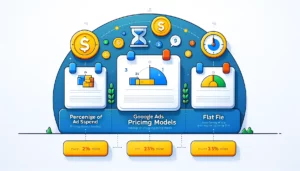Understanding Google Ads Management Costs: Pricing Models and Key Factors

Understanding the costs associated with managing Google Ads is essential for businesses looking to optimise their advertising budget. This article explores various pricing models, key factors influencing costs, and provides strategies for effective budget management. By gaining insights into these areas, businesses can make informed decisions to enhance their advertising performance and achieve better returns on investment.
Key Takeaways
- Familiarise yourself with the three main pricing models: Percentage of Ad Spend, Flat Fee, and Hourly Rate, to choose the one that best fits your budget and advertising goals.
- Recognise that factors like ad budget size, industry competition, and the expertise of the manager play significant roles in determining the overall management costs.
- Utilise strategies such as setting clear objectives and understanding billing cycles to effectively manage and allocate your Google Ads budget.
- Leverage tools like analytics and automation to optimise cost management and improve ad performance.
- Stay updated on future trends in Google Ads pricing to adapt your strategies accordingly and maintain cost-efficiency.
Overview of Google Ads Management Pricing Models
When you’re diving into the world of Google Ads, understanding the different pricing models can significantly impact how you manage your budget and strategy. Let’s explore the three primary models you’ll encounter:
Percentage of Ad Spend
This model is quite straightforward—your management costs are directly tied to your advertising spend. Typically, agencies charge between 10% to 20% of your total ad spend. This model is beneficial if you’re looking for a cost that adjusts with your advertising intensity.
Flat Fee
A flat fee model is ideal if you prefer predictable costs. Agencies might offer a standard rate regardless of your ad spend, which helps in budgeting especially when your ad spend fluctuates. This fee usually covers management, strategy development, and regular reporting.
Hourly Rate
If your needs are highly specific or you require specialised services, an hourly rate might be the most suitable. This model allows you to pay for exactly the amount of work done, which can be cost-effective for smaller or less frequent campaigns.
Choosing the right pricing model depends on your campaign size, frequency, and specific needs. It’s crucial to align your choice with your overall marketing goals and budget to ensure the most efficient use of resources.
Factors Influencing Google Ads Management Costs
Ad Budget Size
The size of your ad budget directly impacts the scope and scale of your Google Ads campaigns. A larger budget allows for more aggressive bidding and broader ad placements, which can lead to increased visibility and potentially higher returns. However, it’s crucial to balance your spend with realistic expectations of ROI. Effective budget management is key to maximising the impact of your PPC management efforts.
Industry and Competition
The industry you operate in and the level of competition you face are significant factors in determining your Google Ads costs. Highly competitive industries often require higher bids to stand out, especially for coveted keywords. Understanding the competitive landscape can help you strategise better and allocate your budget more effectively. Regular Google ads audits can provide insights into how your ads perform against competitors.
Manager’s Expertise and Experience
The expertise and experience of your PPC agency or manager play a crucial role in the success of your campaigns. Experienced managers can optimise ad spend and improve campaign performance through advanced strategies and insights. Choosing the right PPC ad agency with a proven track record is essential for ensuring that your investment in Google Ads agencies is managed effectively and yields the best possible results.
Strategies for Budgeting in Google Ads
Setting Clear Objectives
Establishing clear objectives is the cornerstone of effective budget management in Google Ads. Begin by defining what you hope to achieve with your ads, whether it’s increasing brand awareness, generating leads, or driving sales. This clarity will guide your budget allocation and help you measure success against your goals.
Understanding Billing Cycles
It’s crucial to understand the billing cycles of Google Ads to manage your budget effectively. Google Ads typically operates on a monthly billing cycle, but you can adjust your settings for more frequent notifications and updates. This knowledge allows you to plan your spend throughout the month and avoid surprises.
Allocating Budgets Across Campaigns
To optimise your ad spend, distribute your budget across different campaigns based on performance and strategic goals. Use tools like Google Ads Budget Planner to forecast campaign performance and make informed decisions. Here’s a simple breakdown of how you might allocate a £10,000 monthly budget across three different campaigns:
| Campaign Type | Allocation |
|---|---|
| Brand Awareness | £4,000 |
| Lead Generation | £3,500 |
| Direct Sales | £2,500 |
Regularly review and adjust these allocations based on analytics and campaign outcomes to ensure the most efficient use of your advertising budget.
Tools and Techniques for Effective Cost Management
Utilising Analytics and Reporting
To effectively manage your Google Ads costs, it’s crucial to leverage analytics and reporting tools. These tools provide you with detailed insights into campaign performance, costs, and key metrics, allowing you to make data-driven decisions. Regularly reviewing these reports helps you understand what’s working and what isn’t, enabling you to optimise your campaigns for better performance and cost-efficiency.
Leveraging Automation Tools
Automation tools can significantly enhance your Google Ads Management Costs by reducing manual tasks and improving campaign efficiency. Tools like Google Ads Budget Planner and Campaign Drafts and Experiments allow you to test changes and forecast performance based on different budget scenarios before fully implementing them. This proactive approach helps in minimising wasteful spend and enhancing ROI.
Regular Review and Adjustment
Regularly reviewing and adjusting your Google Ads campaigns is essential for maintaining cost-effectiveness. It’s not just about setting up campaigns; it’s about continuously optimising them. Implement strategies such as improving Quality Score, targeting specific audiences, and optimising ad scheduling. This ongoing process ensures that your advertising budget is always aligned with your marketing objectives, maximising your investment.
Future Trends in Google Ads Pricing
Shifts in Pricing Models
As the digital advertising landscape becomes more competitive, you can expect significant shifts in Google Ads pricing models. The evolution towards more dynamic and performance-based pricing will likely dominate, aiming to offer advertisers better ROI. This shift means you’ll need to stay agile and informed to leverage the most cost-effective strategies.
Technological Advancements
The integration of advanced technologies such as AI and machine learning is set to redefine how Google Ads costs are managed. These technologies promise to enhance bidding strategies and ad targeting, potentially lowering costs while improving campaign effectiveness. Embrace these advancements to stay ahead in the eCommerce ppc game.
Changes in Advertising Regulations
Regulatory changes could also impact Google Ads pricing. As governments and regulatory bodies tighten controls over digital advertising, you may face new compliance costs or shifts in how ads are priced and managed. Stay proactive in understanding these changes to mitigate any adverse effects on your advertising budgets.
Evaluating Return on Investment (ROI) for Google Ads
Measuring Performance Metrics
To truly understand the effectiveness of your Google Ads campaigns, you must dive deep into performance metrics. Key indicators such as click-through rates, conversion rates, and cost per acquisition provide a clear picture of how well your ads are performing. Regularly tracking these metrics will help you identify areas for improvement and optimise your campaigns for better ROI.
Comparing Costs vs. Benefits
When considering the costs of Google Ads, it’s crucial to weigh them against the benefits received. This analysis will help you determine whether the investment is justifiable. For instance, if the cost per click is high, but the conversions it brings are of high value, the investment might be worthwhile. Remember, it’s not just about the amount spent, but the quality of the returns.
Long-term Value Assessment
Evaluating the long-term value of your Google Ads campaigns is essential. Consider factors like customer lifetime value and brand awareness that are boosted by your ads. These elements contribute to the overall success and sustainability of your advertising efforts. By focusing on long-term outcomes, you can make more informed decisions that align with your business goals.
Choosing the Right Google Ads Management Service
Assessing Pricing Transparency
When selecting a Google ads agency, it’s crucial to assess their pricing transparency. Ensure that all costs are clearly outlined before you commit. This includes setup fees, management fees, and any additional charges that might apply. Transparent pricing not only helps you budget effectively but also builds trust between you and the agency.
Reviewing Service Offerings
Review the range of services offered by potential agencies. A comprehensive PPC eCommerce agency should offer more than just ad management; look for services like keyword research, campaign analysis, and conversion optimisation. This holistic approach ensures that all aspects of your PPC campaigns are covered, enhancing the likelihood of success.
Considering Client Testimonials and Case Studies
Finally, consider the testimonials and case studies provided by the agency. These are invaluable for understanding the real-world effectiveness of the agency’s strategies. Look for testimonials from businesses similar to yours, especially those in your industry or with similar advertising goals. This can give you a clearer insight into what to expect and how the agency has navigated challenges similar to those you might face.
Conclusion on Google Ads Management Pricing
In conclusion, understanding the various pricing models and key factors influencing Google Ads management costs is crucial for any business looking to optimise its advertising strategy. Whether you choose a percentage of ad spend, a flat fee, or an hourly rate, each model offers distinct advantages depending on your budget, campaign goals, and the complexity of your ads. By considering these elements carefully, you can align your Google Ads investment with your overall marketing objectives, ensuring a more efficient and effective campaign. Remember, the right knowledge and approach can significantly enhance your ROI, making every pound count in your digital advertising efforts.
Frequently Asked Questions for Google Ads Management Costs
What are the common pricing models for Google Ads management?
The common pricing models for Google Ads management include Percentage of Ad Spend, Flat Fee, and Hourly Rate. Each model suits different types of advertising goals and budgets.
How does the ‘Percentage of Ad Spend’ model work?
In the ‘Percentage of Ad Spend’ model, the manager charges a percentage, typically between 10-20%, of your total monthly ad spend. This model incentivises managers to optimise your ad spend to achieve better ROI.
What is a Flat Fee pricing model?
A Flat Fee model involves a fixed monthly charge regardless of the ad spend. This model provides budget predictability but may not be ideal if your ad spend fluctuates significantly.
Are there any factors that influence Google Ads management costs?
Yes, factors such as ad budget size, industry competitiveness, and the expertise and experience of the manager can significantly influence Google Ads management costs.
What strategies can help in budgeting for Google Ads?
Effective strategies include setting clear objectives, understanding billing cycles, and allocating budgets across different campaigns to maximise efficiency and effectiveness.
How can one evaluate the ROI from Google Ads?
Evaluating ROI involves measuring performance metrics, comparing costs versus benefits, and assessing the long-term value of the ads to ensure they meet your business objectives.
Author
Search Blog
Free PPC Audit
Subscribe to our Newsletter
The Voices of Our Success: Your Words, Our Pride
Don't just take our word for it. With over 100+ five-star reviews, we let our work-and our satisfied clients-speak for us.
"We have been working with PPC Geeks for around 6 months and have found Mark and the team to be very impressive. Having worked with a few companies in this and similar sectors, I rate PPC Geeks as the strongest I have come across. They have taken time to understand our business, our market and competitors and supported us to devise a strategy to generate business. I value the expertise Mark and his team provide and trust them to make the best recommendations for the long-term."
~ Just Go, Alasdair Anderson




